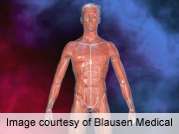For vitamin D deficient individuals, cholecalciferol therapy is associated with reduced phosphocreatine recovery half-time in skeletal muscle and with improvements in fatigue, according to a study presented at the annual meeting of the Society for Endocrinology/British Endocrine Societies, held from March 18 to 21 in Harrogate, U.K.
(HealthDay)—For vitamin D deficient individuals, cholecalciferol therapy is associated with reduced phosphocreatine recovery half-time in skeletal muscle and with improvements in fatigue, according to a study presented at the annual meeting of the Society for Endocrinology/British Endocrine Societies, held from March 18 to 21 in Harrogate, U.K.
Akash Sinha, M.B.B.S., from Newcastle University in the United Kingdom, and colleagues conducted a longitudinal study to examine the effect of cholecalciferol therapy on skeletal mitochondrial oxidative function in the gastroc-soleus compartment in 12 symptomatic, vitamin D deficient individuals. Phosphocreatine recovery kinetics were assessed using phosphorus-31 magnetic resonance spectroscopy measurements in cases before and after treatment with cholecalciferol and in 15 healthy controls.
The researchers found that following cholecalciferol therapy there was a significant reduction in phosphocreatine recovery half-time, indicating an improvement in maximal oxidative phosphorylation. This correlated with improvements in mean serum 25-hydroxyvitamin D (25[OH]D) levels. At rest, there was no difference seen in phosphate metabolites. Decreasing 25(OH)D levels correlated with increasing phosphocreatine recovery half-time. An improvement in fatigue was noted by all patients following cholecalciferol therapy.
"This is the first time a link has been shown between vitamin D status and muscle aerobic function," Sinha said in a statement. "Patients with vitamin D deficiency often experience symptoms of muscle fatigue. Our findings in a small group of patients with very low vitamin D levels show that muscle efficiency significantly improves when vitamin D status is improved."
More information:
Abstract
More Information
Health News Copyright © 2013 HealthDay. All rights reserved.


















